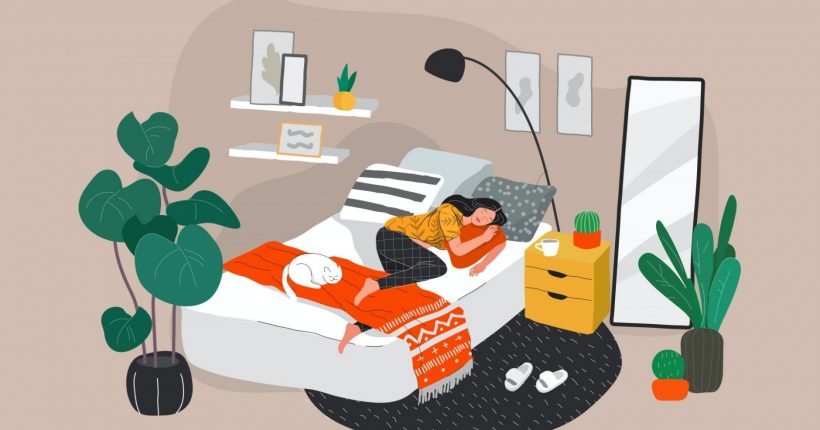Written by Lauren Geall
As Stylist’s digital writer, Lauren Geall writes on topics including mental health, wellbeing and work. She’s also a big fan of houseplants and likes to dabble in film and TV from time-to-time.
To mark World Sleep Day, Stylist’s Lauren Geall sat down with Premier Inn’s resident sleep expert Natalie Pennicotte-Collier to pick apart her sleep habits.
I’m one of those annoying people who’s never really had any problems with their sleep.
Whenever my friends complain about waking up in the middle of the night or discuss their favourite pillow sprays and sleep meditations, I often feel quite out of the loop. I’m grateful to say that during my adult life so far, I’ve faced very few issues falling and staying asleep.
That’s not to say I’m never tired – in fact, I often struggle with afternoon and evening tiredness, and regularly find it hard to pull myself out of bed.
I also tend to fall asleep as soon as I get into bed in the evenings, something I’ve recently found out isn’t a good sign.
However, I’d always assumed this was just a part of my personality – that I needed a lot of sleep to feel rested, and would have to deal with feeling a little bit lethargic sometimes.
That was, until I sat down for a ‘Sleep MOT’ session with Premier Inn’s resident sleep expert Natalie Pennicotte-Collier ahead of World Sleep Day (18 March).
As it turns out, I’m not as good at sleeping as I thought I was – the fact that I’m so tired in the morning and evenings serves as one prime example. It was a pretty enlightening session – and I came away with plenty of things to work on. Here are just three of the things I learned.
-
1. Sleep starts the moment you wake up

Sleep depends on more than just your evening routine. While focusing on what you do before going to bed is important if you’re struggling to sleep, paying attention to your daily routine as a whole can also make a big difference.
“Sleep starts the moment you wake up,” Pennicotte-Collier explains. “We build our sleep trust throughout the day, and we build it both because we’re creating sleep pressure and because of our circadian rhythms. Not many people understand the impact of light, but it’s very important.
“We have these separate rods and cones in the back of our eyes which pick up not only the amount of light around us and the time of day, but also where we are in the seasons. Animals have them too, but we ignore ours – we don’t spend enough time outside.”
This is why getting outside in the morning has been proven to help you feel more relaxed and energised – exposure to light helps to regulate your circadian rhythm, which in turn keeps the hormones that help us fall asleep and stay awake in check.
-
2. Antidepressants can affect the ‘recipe’ of your sleep

Antidepressants can affect your sleep. As well as feeling tired when I wake up and in the evenings, I also tend to experience quite vivid dreams – something I’m pretty sure comes from the antidepressant medication I take to manage my OCD and anxiety.
“While there’s less stigma surrounding taking medication for your mental health these days, which is great, GPs don’t necessarily have the knowledge to share the link between antidepressants and sleep and say, actually, the antidepressants are going to change the quality of your sleep and change the recipe of your sleep,” Pennicotte-Collier says.
-
3. Rest during the day is the key to feeling more energised

Non-sleep deep rest is a great way to re-energise in the middle of the day. Instead of increasing how long I sleep at night – I already get around eight hours, after all – Pennicotte-Collier recommended shortening my sleep period slightly, but building in moments of ‘non-sleep deep rest’ throughout the day.
“Non-sleep deep rest doesn’t have to be a 20-minute nap or sleep as we know it – it could be a 20-minute nervous system wind down, ideally in nature and ideally in bright light,” Pennicotte-Collier explains.
There’s no one way to practise non-sleep deep rest – it can be anything from a walk outside to sitting still on a park bench or in front of a window – all you need to do is ensure you’re making time for stillness and space.
Being able to spend time just with ourselves, Pennicotte-Collier adds, is a great skill to develop when it comes to our sleep as it improves our ability to unwind without the help of external influences like technology.
Indeed, as she explains when I tell her I often listen to a podcast on my lunchtime walks: “Whenever we’re trying to have non-sleep deep rest or a moment of central nervous relaxation, the quieter it can be, the fewer brain regions we’re lighting up.”
To check out more of Pennicotte-Collier’s sleep tips, you can visit the Premier Inn Instagram.
Images: Getty
Source: Read Full Article
